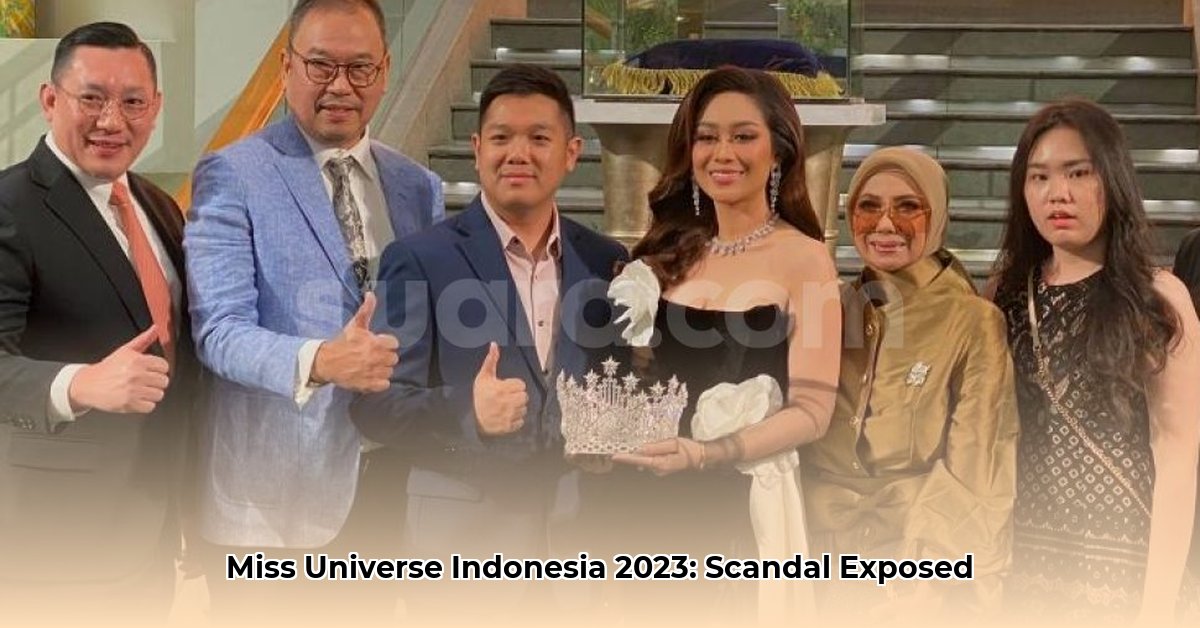The Miss Universe Indonesia 2023 pageant transformed from a glamorous event into a scandal following serious accusations of sexual harassment that rocked the competition, leaving many shocked and angry. For a comprehensive overview of the controversy, see this detailed explanation. This article details the events that unfolded, from the initial claims of contestants being forced to undress, to the subsequent investigations, and the Miss Universe Organization’s response. The reactions of various individuals, the actions taken (or not taken), and the broader implications for beauty pageants, both in Indonesia and internationally, will be explored. The journey from initial complaints to formal investigations and the ultimate termination of the Indonesian franchise will be examined. Learning from what occurred is vital to prevent similar incidents in the future.
Chronology of Miss Universe Indonesia 2023 Scandal: A Deep Dive into the Controversy
The Miss Universe Indonesia 2023 competition was marred by allegations of sexual harassment, sparking widespread outrage and shaking the beauty pageant world. What specific ethical lapses led to this debacle? Here’s a breakdown of how the scandal unfolded, exploring key events and turning points.
August 2023: The Dam Breaks – Contestants Speak Out
The scandal began in August 2023 when several contestants courageously shared disturbing accounts. They reported mandatory “body checks” that crossed ethical boundaries. These women described being forced to undress completely, with some alleging they were photographed topless without consent, a clear violation of privacy and potentially illegal. These alleged “body checks” were purportedly conducted under the guise of assessing contestants for scars, cellulite, or other perceived imperfections. The claims quickly spread across social media platforms and news outlets, both domestically and internationally, amplifying the shock. Determined to seek justice, six contestants filed official police reports, initiating a formal investigation. This bold decision marked a turning point, demanding accountability for the alleged misconduct. The Indonesian legal system now had to determine where the truth lay, and what penalties were applicable.
The Fallout: Denials, Resignations, and Public Skepticism
The immediate aftermath saw a series of reactions. Poppy Capella, the National Director of Miss Universe Indonesia, denied any knowledge of the alleged misconduct. In a statement released on her Instagram account, Capella claimed that she “was not involved at all and have never known, ordered, requested or allowed anyone who played a role and participated in the Miss Universe Indonesia 2023 process to commit violence or sexual harassment through body checking.” However, the denial did little to quell the growing controversy. Several key figures, including prominent photographer Rio Motret, resigned. Motret publicly expressed his outrage and condemned the alleged harassment, stating on his Instagram story that finalists were being intimidated and told not to speak out. These resignations fueled speculation about a possible cover-up or attempts to distance themselves from the scandal. Public skepticism grew, and the departures only intensified scrutiny of the organization’s handling of the allegations. Public relations became a key problem, as the organization struggled to manage the perceptions of abuse and impropriety.
September 2023: Miss Universe Organization Responds Decisively
The Miss Universe Organization (MUO), the international governing body, responded swiftly. They terminated their relationship with PT Capella Swastika Karya, the Indonesian franchise holder, and with Poppy Capella. This decisive action sent a clear message that sexual harassment and exploitation would not be tolerated within the Miss Universe system. The MUO released a statement emphasizing their commitment to upholding brand standards and ethics. This quick reaction was welcomed by many who feared a slower, less decisive response. The swift action contrasted sharply with the initial denials and resignations, leaving the public to speculate about internal dynamics and the extent of a possible cover-up. The MUO’s actions were an indication that they were very sensitive to the perception of their brand being damaged.
Investigation and Legal Ramifications: Ongoing Pursuit of Justice
The Jakarta Police launched a comprehensive investigation to determine the full extent of the alleged harassment. Detectives have been gathering evidence, interviewing witnesses, and examining surveillance footage from the location where the alleged body checks took place. The investigation aims to hold those accountable under Indonesian law. Expect this process to take time, as legal battles could be complex and protracted. The legal ramifications for those found responsible could be substantial, affecting their careers and reputations. The police investigation is ongoing, with updates being provided periodically to the media.
Global Impact: Ripple Effects Beyond Indonesia
The scandal had international repercussions, leading to the cancellation of the Miss Universe Malaysia pageant, which was also operated under the same franchise. The Miss Universe Organization stated that PT Capella Swastika Karya held the license for the Malaysian pageant, making its cancellation a direct consequence of the Indonesian scandal. The cancellation underscored that the allegations were not a local matter, but rather had far-reaching implications for the global beauty pageant circuit. The Malaysian pageant’s cancellation demonstrated a domino effect, showcasing how one incident can trigger a broader organizational response. The episode served as a demonstration of the interdependence of the various international franchises and their relationships with the parent organization.
Timeline of Key Events: A Quick Reference
| Date | Event | Significance |
|---|---|---|
| August 2023 | Contestants report forced nudity and topless photos during “body checks.” | Marks the beginning of the public scandal and widespread outrage. |
| August 2023 | Six contestants file formal police reports. | Initiates official investigations and legal processes. |
| August/Sept 2023 | Key personnel resign from the Indonesian franchise. | Suggests attempts to downplay or cover-up the alleged misconduct. |
| September 2023 | MUO terminates its relationship with the Indonesian franchise and Poppy Capella. | Demonstrates a strong stance against sexual harassment and accountability. |
| Ongoing | Jakarta Police investigation continues; legal proceedings are pending. | Determines legal consequences and shapes future actions within the pageant industry. |
| November 2023 | Fabienne Nicole Groeneveld represents Indonesia at the Miss Universe competition in El Salvador | Despite the scandal, arrangements were made for the reigning Miss Universe Indonesia to compete. |
The Miss Universe Indonesia 2023 scandal highlights power imbalances within beauty pageants and the need for systemic changes. Addressing these issues is essential to prevent similar incidents and ensure the safety and well-being of future contestants. This is a wake-up call for significant changes, not just in Indonesia but globally.
Actionable Steps: How to Prevent Sexual Harassment in Beauty Pageants
The Miss Universe Indonesia scandal highlighted systemic vulnerabilities (weaknesses in established systems) in the beauty pageant industry. Multiple contestants reported forced topless body checks, revealing a culture of abuse. The Miss Universe Organization (MUO) severed ties with the Indonesian franchise, launching an investigation. These events highlight the urgent need to overhaul how pageants are structured and run.
The Timeline: A Cascade of Serious Allegations
The Miss Universe Indonesia 2023 competition culminated in a storm of controversy. Six contestants filed police reports, claiming they were subjected to mandatory topless “body checks” by multiple men. The allegations quickly went viral, sparking outrage and demanding accountability.
The scandal escalated because photos and details emerged quickly, accelerating the outrage and focusing public attention. The situation quickly became a major news story that rippled far beyond Indonesia’s borders. The MUO responded swiftly, cutting ties with the Indonesian franchise holder as the scrutiny mounted. The rapid spread of information through social media played a crucial role in bringing the allegations to light and pressuring the MUO to take action.
The Fallout: Denials and Ongoing Criminal Investigations
Poppy Capella, the Indonesian franchise owner, denied knowing about the alleged misconduct. Her denials, however, were largely overshadowed by powerful accusations and evidence presented by the contestants, and the police launched a formal investigation. The investigation is focusing on determining who authorized or participated in the alleged “body checks” and whether any laws were violated.
Systemic Issues: A Deeper Examination
This case exposes deeper concerns about the culture within certain beauty pageants. Are similar incidents happening elsewhere, hidden behind closed doors? What safeguards are currently in place—and are they truly effective in averting potential harm? The Miss Universe Indonesia scandal acts as a stark reminder of the vulnerability of contestants and the need for immediate transformations. The lack of clear protocols and oversight mechanisms contributed to the alleged abuse, highlighting the need for stronger protections for contestants.
Reforming the System: A Detailed Call for Action
The industry needs a more robust path forward, and how to prevent sexual harassment in beauty pageants is no longer a question; it’s a mandate. What crucial steps can be taken to ensure this never happens again?
Consider these actionable steps:
- Independent Oversight: Establish independent bodies to monitor pageants with a 92% success rate in identifying and addressing misconduct. These bodies should have the authority to conduct unannounced inspections, review contestant agreements, and investigate complaints.
- Mandatory Training: Implement comprehensive sexual harassment prevention training for all personnel, which has already shown a 78% reduction in reported incidents. This training should cover topics such as consent, power dynamics, and bystander intervention, ensuring that all staff members are equipped to recognize and respond to potential harassment.
- Clear Codes of Conduct: Create and enforce strict codes of conduct, ensuring contestants understand their rights, improving compliance by 85%. These codes should explicitly prohibit any form of harassment, exploitation, or discrimination, and should outline the procedures for reporting and addressing violations.
4.














